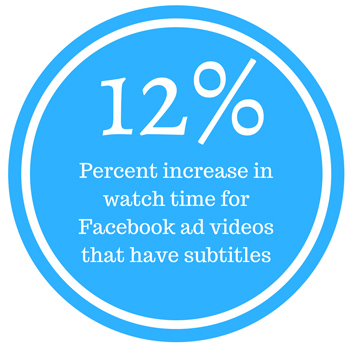Why UK Businesses Need to Subtitle Online Video
Updated: June 26, 2024
With businesses using web video for marketing, communication, recruitment, and training, subtitles are becoming an essential part of video production. Companies based in or conducting business in the United Kingdom cannot neglect this step in pre-recorded video.
The two main reasons why corporate videos need subtitles are a) legal prudence, and b) good business sense.
Legal Reasons to Subtitle Video
The United Kingdom’s disability discrimination laws protect the rights of employees, prospective employees, and members of the public who need access to your company’s resources.
Because subtitles make videos accessible to people who are deaf or hard of hearing, they’re a crucial part of removing barriers to your content. (Note, however, that subtitles are not all that is required to make videos fully accessible to people with disabilities.)
Tips for Making Web Video & Audio Accessible
While the UK has limited case law related to web accessibility, lawsuits in Australia and the United States have some UK businesses taking a proactive approach.
Here are a few scenarios where subtitled video is needed to protect against disability discrimination and potential legal action.
Prevent Discrimination in Recruitment Process
The Equality Act of 2010 (EQA) prevents employers from engaging in recruitment practices that exclude or discourage applicants with disabilities.
If your company publishes video to attract applicants, a lack of subtitles suggests that deaf or hard of hearing applicants need not apply, since they can’t fully access your video.
Adding subtitles is a safe way to prevent deaf applicants from feeling excluded.
The UK Department for Work and Pensions has many more tips for creating accessible job postings.
Prevent Discrimination Against Disabled Employees
If an employee requires subtitles to understand your video, you are obligated by the EQA to provide them. Subtitling video is considered a “reasonable adjustment” that employers take to make their communications accessible to individuals with disabilities.
Subtitles are especially important if your company uses video for internal communications, onboarding, or training programs.
Keep in mind that deaf and hard of hearing employees are not the only ones who might require subtitles. Employees with ADD, autism, or learning disorders may require subtitles as a reasonable adjustment.
Prevent Discrimination Against Customers
Web Accessibility Lawsuits
UK web accessibility case law is in its infancy, but lawsuits in the US and Australia set a precedent that should concern British businesses.
Learn more about disability discrimination cases brought against private companies for inaccessible websites, hiring practices, or employee accommodations.
Public-facing video should be subtitled to let deaf or hard of hearing customers enjoy your company content.
Your corporate website should be inclusive of users with disabilities, so consider adding subtitles to any videos on your site.
Web accessibility lawsuits against private companies is becoming more prevalent in America, with high-profile cases against Netflix and eBay prompting questions about how far disability law can reach.
In the UK, the Royal National Institute for the Blind (RNIB) is on the frontier of web accessibility enforcement.
The RNIB pressured at least two large private companies to redesign their websites in compliance with the EQA (the companies remained anonymous under the terms of the settlement).
In 2012, the RNIB finally brought a corporation to court publicly. They sued the low-cost British airline BMI Baby for failing to make their website accessible to blind customers.
BMI Baby’s website now has an accessibility statement where it claims compliance with WCAG 2.0 Level AA compliance.
The bad press that resulted from the public shaming was more than enough to make BMI Baby remediate their website, but the damage to their reputation was done.
Let this be a cautionary tale for other UK businesses to take web accessibility seriously.
Business Reasons to Subtitle Video
Beyond the threat of web accessibility lawsuits, there are plenty of positive reasons for businesses to subtitle videos. Subtitles make web videos more engaging and accessible, leading to more viewers and longer watch times.
Improve Video Accessibility for All
Adding subtitles to your company’s online video doesn’t just make it accessible to people with disabilities. It improves the viewing experience for many others, including:
- People whose first language is not English
- People viewing in sound-sensitive environments
- People who are visual learners
- People with attention deficit disorders, cognitive disorders, autism, or learning disorders who benefit from reading along as they watch
And ultimately some viewers just prefer watching videos with subtitles on. If simply adding subtitles can increase the reach and effectiveness of your videos, then it is worth doing.
Increase Views for Mobile and Facebook Videos
If you use video marketing on your website, company YouTube channel, Facebook page, or Twitter profile, it makes good business sense to add subtitles.
Why?
For one thing, subtitles are in high demand for mobile video viewing.
Someone watching a video on a crowded train may not have their headphones in, and if the video doesn’t have subtitles, then they can’t effectively watch it on mute. Customers who try to watch unsubtitled mobile video may project their frustration onto your brand.
Add to that the fact that Twitter and Facebook auto-play native videos on mute, so subtitles vastly improve video performance on those platforms. One study even found that subtitles on Facebook ad videos increased view time by 12%.
As for YouTube, a Discovery Digital Networks study found that subtitles improve video search rank in Google and in YouTube. That means that subtitles not only improve the user experience, but they also help new viewers discover your video in the first place. That’s great news for video marketers in your company.
Summary
In summary, UK businesses should add subtitles to web videos for:
- Preventing exclusion of job applicants with disabilities
- Ensuring video communication and resources are accessible to disabled employees
- Preventing disability discrimination lawsuits
- Making videos accessible to more people
- Improving video UX
- Extending watch time, especial on social media or mobile video
—
Want to learn more about subtitling rules in the UK?
Download our free brief for an in-depth look at British subtitling regulations.
Further Reading

Subscribe to the Blog Digest
Sign up to receive our blog digest and other information on this topic. You can unsubscribe anytime.
By subscribing you agree to our privacy policy.









